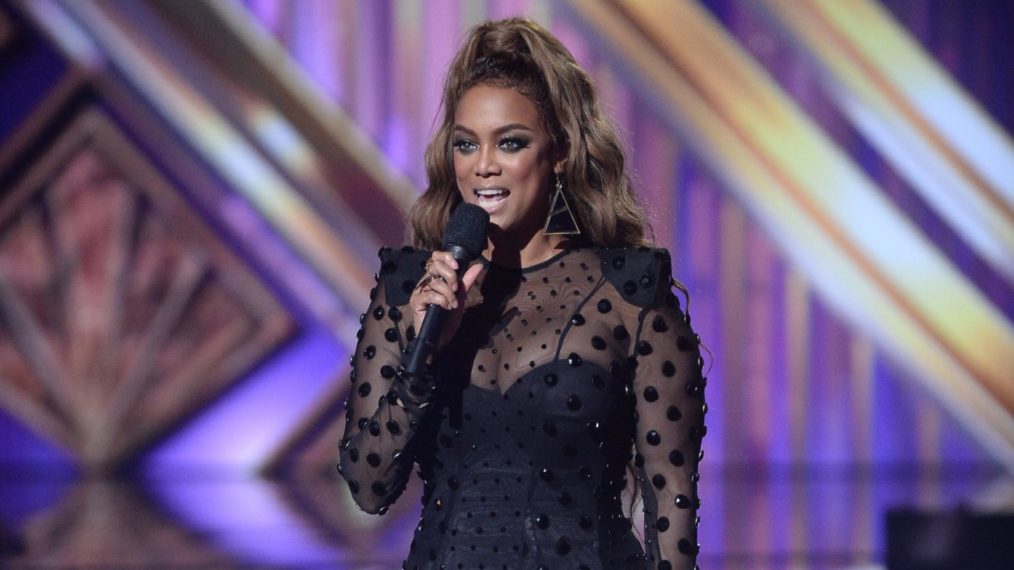#I Am Woman: Life-Affirming and Hopeful Film Chronicles Feminist Icon Helen Reddy

“#I Am Woman: Life-Affirming and Hopeful Film Chronicles Feminist Icon Helen Reddy”
“I am woman, hear me roar.”
Whether or not you even realize it, you’re probably familiar with Helen Reddy and her unofficial anthem for the women’s movement, “I Am Woman.”
I Am Woman, the movie, drops tomorrow in theaters and on-demand. Find out what we thought of it in our review.
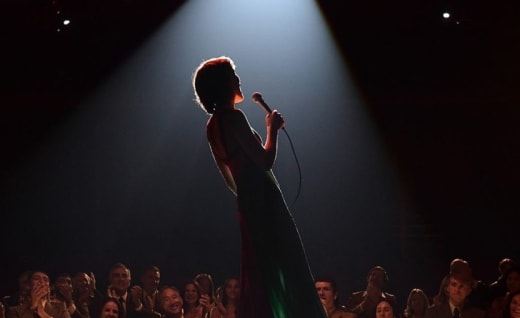
Tilda Cobham-Hervey stars as Reddy, a young Australian singer who moved to the US in the 60s because that’s where singers had to be to get noticed, the character in the film suggests.
Cobham-Hervey, who doesn’t sing, still does a remarkable job portraying the 1970s hitmaker. Specifically, the way Reddy held herself and strutted across a stage is recognizable instantly, and you can tell Cobham-Hervey practiced that because she’s got it down pat.
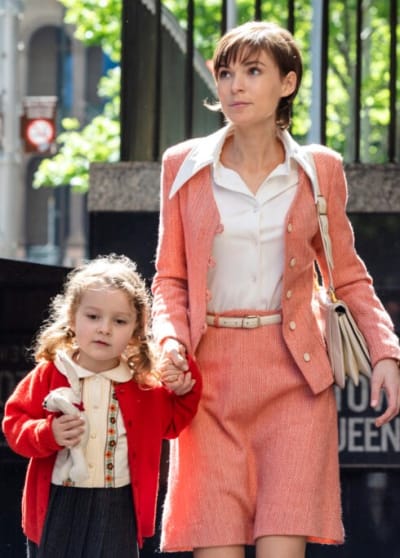
Despite the seemingly full focus on Reddy given the title and lead performance, the story encompasses other influential people at the time, and that rounded approach makes the film sing.
The road to success took a lot of work for Reddy despite her voice and early success in Australia. She came to the US after winning a TV talent contest, but upon arrival, the deal she was promised fell apart.
Deciding to stay in the US, Reddy met journalist and fellow Aussie, Lilian Roxon (Danielle Macdonald), whose work set the stage for music analysis. Having been unaware of the friendship between Reddy and the woman who founded critical rock and roll journalism, those notes of the film were some of the best.
Even with her unofficial anthem, Reddy isn’t one of the better-known artists 50 years after the fact. But her relationship with Roxon and how the journalist helped Reddy find her voice is a refreshing depiction of two women inspiring each other to make it in a man’s world.
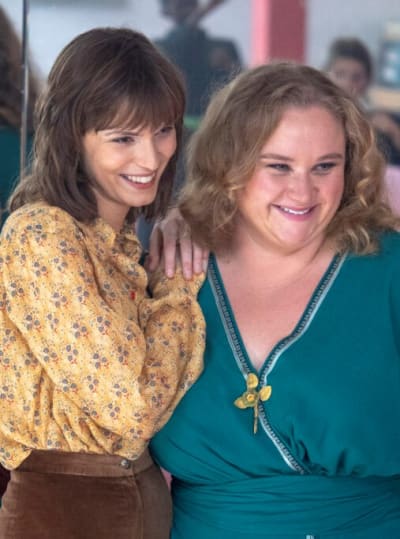
Part of Reddy’s inability to land a contract early in her career was because, with the proliferation of male vocal groups, it wasn’t believed that a woman could command an audience.
With her nose to the ever-changing winds of the music scene, Reddy met and fell in love with her future husband and manager, Jeff Wald (Evan Peters). Theirs was a turbulent relationship, and it’s difficult watching Wald promote others successfully but seemingly giving up on the talented woman he married.
Peters embodies the man, making you love him and hate him at the same time. Reddy eventually finds success after pressuring her husband and manager to treat her the same way he treated his well-known clients.
One of the most memorable scenes of the film features Reddy and Wald locked in a room together, Wald making call after call to the Capitol Records exec in an effort to secure her a recording session.
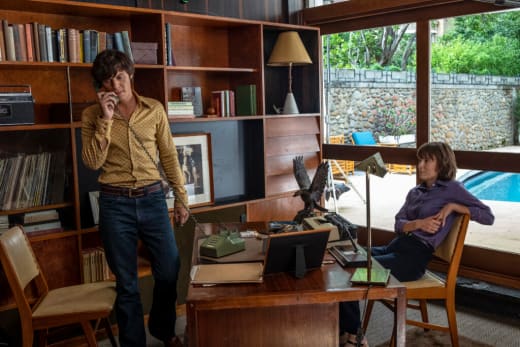
Every time he wanted to give up, Reddy asked if he’d give up on his other clients that way (those who were already commercial successes), and that prompted him to continue the effort.
Together, they captured magic with Reddy’s first singles. In the film, they skip over her first hit in 1968, One Way Ticket, and focus on “I Believe In Music,” and the B-Side, “I Don’t Know How to Love Him,” which became a top-ten hit in Canada.
Wald’s reemerged faith in his wife helped her gain confidence in the booth, if we’re to believe the film, and that confidence is what would carry her subsequent hits, as well.
Another memorable scene from the film features Reddy, Wald, her daughter Traci, and various friends and associates the family brought into their home to begin an all-out assault on local radio stations to play her singles.

It’s hard to believe there was a time when manipulating the charts took such hard work and camaraderie in our digital world. But it brings back great memories for older types who still remember those days of phones connected to the wall and the impact you could achieve using them.
It was when she began writing some more of her own songs that she truly found herself in her career.
Reddy credited her early awareness of the women’s movement to Roxon at a time she was up against a wall hearing too often that a woman couldn’t get the job done, which led to co-writing “I Am Woman” with Ray Burton.
But writing and recording the song didn’t give it wings; it was after it was adopted by other women, feeling the message behind it and calling their local stations with the same fervor Reddy and Wald once used to get her noticed, that “I Am Woman” reached number one on the Billboard Charts.
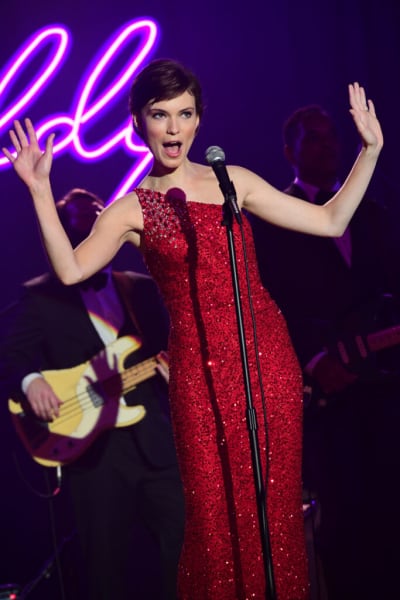
The film uses historical footage well. The actual broadcast of the Grammy Awards in which Reddy became the first Australian to win the award, introduces Reddy only to have Cobham-Hervey walk onto the stage to accept.
Not many movies use the technique as well as I Am Woman, and given its relevance to the women’s movement, it’s much appreciated.
Historical context and recreations are used throughout to great effect. Phyllis Shaffley and Shirley Chisholm (recently covered on FX’s Mrs. America, too) and historical marches on Washington DC, which was painstakingly recreated for Reddy’s performance at the NOW event in 1989, help show the significance of Reddy’s journey.
Other than the music and the movement, a good portion of the film depicts Reddy’s relationship with Wald; the good, the bad, and the ugly.
And it did get pretty ugly, with Wald eventually losing everything Reddy had achieved, draining her bank account and losing their house.
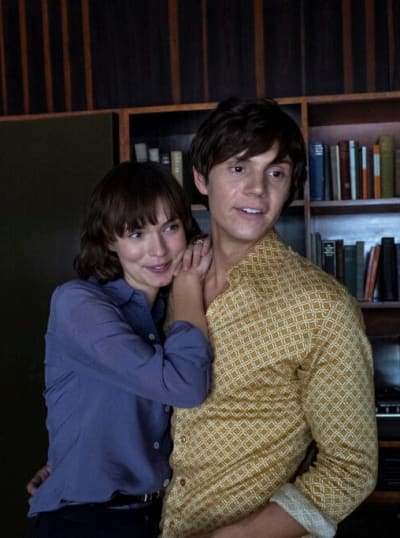
It’s surprising given that Wald is a world-renowned manager and producer with clients such as Donna Summer, Crosby, Stills and Nash, Roseanne Barr, and more and productions ranging from The Contender and 2 Days In The Valley.
But love greatly complicates business arrangements and vice versa, and the connection between Reddy and Wald is a great reminder of how difficult it is to mix the two.
I Am Woman is Reddy’s story, of course, but it’s also the dawning of a movement that hasn’t gotten its due yet. Maybe it’s time to officially adopt the song and ensure that the long fight for women’s rights culminates in the successful ratification of the Constitution. We’ve earned it.
When you see Reddy singing to a crowd that would make any presidential nominee jealous, with men and women singing along, it’s life-affirming and hopeful, downright invigorating. As 2020 has reminded us, it’s never too late to demand justice for our cause.
I Am Woman will be in theaters and on-demand beginning Friday, September 11, 2020.
Carissa Pavlica is the managing editor and a staff writer and critic for TV Fanatic. She’s a member of the Critic’s Choice Association, enjoys mentoring writers, cats, and passionately discussing the nuances of television and film. Follow her on Twitter and email her here at TV Fanatic.
If you want to read more Like this articles, you can visit our Social Media category.
if you want to watch Movies or Tv Shows go to Dizi.BuradaBiliyorum.Com for forums sites go to Forum.BuradaBiliyorum.Com

